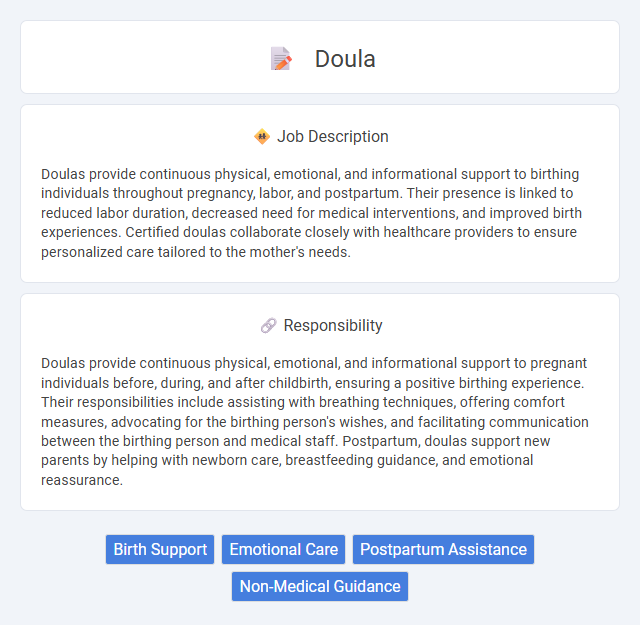
Doulas provide continuous physical, emotional, and informational support to birthing individuals throughout pregnancy, labor, and postpartum. Their presence is linked to reduced labor duration, decreased need for medical interventions, and improved birth experiences. Certified doulas collaborate closely with healthcare providers to ensure personalized care tailored to the mother's needs.
Individuals with strong empathy, patience, and effective communication skills are more likely to be suitable for a doula job, as it involves providing emotional and physical support during childbirth. Those who can remain calm under pressure and have a genuine desire to help others may find this role fulfilling and well-suited to their personality. People lacking these attributes or feeling uncomfortable in high-intensity, emotionally charged situations might struggle with the demands of a doula position.
Qualification
Doulas typically hold certifications from recognized organizations such as DONA International or CAPPA, which require completion of specialized training courses in childbirth education, breastfeeding support, and labor comfort techniques. They must demonstrate strong communication skills, empathy, and knowledge of prenatal, birth, and postpartum care to effectively support mothers. Practical experience through supervised births and ongoing professional development is essential to maintain competence and meet the diverse needs of families.
Responsibility
Doulas provide continuous physical, emotional, and informational support to pregnant individuals before, during, and after childbirth, ensuring a positive birthing experience. Their responsibilities include assisting with breathing techniques, offering comfort measures, advocating for the birthing person's wishes, and facilitating communication between the birthing person and medical staff. Postpartum, doulas support new parents by helping with newborn care, breastfeeding guidance, and emotional reassurance.
Benefit
Hiring a doula likely increases the probability of a positive childbirth experience by providing continuous emotional and physical support. Research suggests that the presence of a doula may reduce labor duration, decrease the need for interventions, and improve maternal satisfaction. Couples opting for a doula might also experience enhanced communication with medical staff and better postpartum adjustment.
Challenge
Challenges in the doula profession probably include managing the emotional and physical demands of supporting birthing individuals through labor while maintaining empathy and resilience. Navigating diverse cultural and personal birth preferences may require adaptability and strong communication skills. Balancing irregular hours with personal well-being could frequently test the doula's stamina and dedication.
Career Advancement
Doulas can enhance career advancement by obtaining advanced certifications such as childbirth education, lactation consulting, or postpartum support credentials. Expanding skills in specialized areas increases demand and allows doulas to work in hospitals, birthing centers, or private clientele. Networking with healthcare professionals and joining professional organizations like DONA International boosts credibility and access to higher-level opportunities.
Key Terms
Birth Support
Doulas provide continuous physical, emotional, and informational support to mothers during childbirth, enhancing comfort and reducing stress. Birth support from doulas is linked to shorter labor, reduced need for pain medication, and higher satisfaction with the birthing experience. Their expertise in relaxation techniques, breathing exercises, and advocacy empowers women to achieve a more positive and empowered birth journey.
Emotional Care
Doulas provide essential emotional support to expectant mothers, helping to reduce anxiety and promote confidence throughout pregnancy and childbirth. Their presence offers continuous reassurance and compassionate guidance, fostering a calming environment during labor. This emotional care contributes to better birth outcomes and enhances the overall birthing experience.
Postpartum Assistance
A doula provides essential postpartum assistance by offering emotional support, breastfeeding guidance, and newborn care education to new mothers. Their presence helps reduce maternal stress, promote recovery, and foster bonding between mother and baby. Research indicates that postpartum doulas contribute to improved maternal mental health and higher rates of successful breastfeeding.
Non-Medical Guidance
Doulas provide essential non-medical guidance throughout pregnancy, labor, and postpartum, offering emotional support, comfort measures, and informational resources to birthing individuals. Their role includes personalized advocacy, helping clients navigate birth plans and communicate preferences to medical staff without performing clinical tasks. By fostering a supportive environment, doulas enhance the overall birth experience and promote positive maternal outcomes.
 kuljobs.com
kuljobs.com